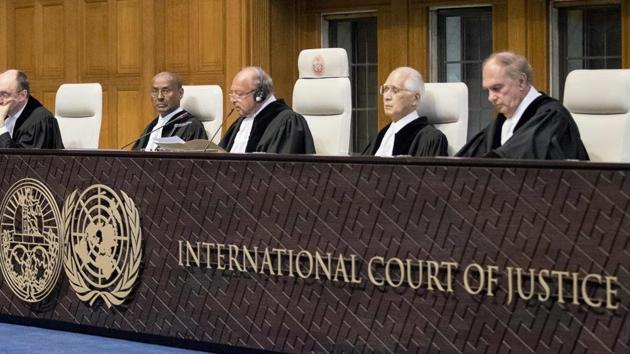India and UK slug it out over International Court of Justice post today. All you need to know
As the stakes are high for both the parties, chances of withdrawing a candidate are minimal.
The sixth round of voting to select a judge to the International Court of Justice (ICJ) is a runoff between India and the UK, with former Supreme Court judge Justice Dalveer Bhandari pitted against British jurist Christopher Greenwood.

1. Both them are seeking re-election. The Hague-based ICJ has 15 judges with a nine-year term, but five vacancies come up for polls once in three years. To emerge victorious, a candidate has to win a majority of 97 votes or more in the UN general assembly and a majority of eight in the UN Security Council of 15 members (five permanent and 10 non-permanent). Four judges from France, Somalia, Brazil and Lebanon were elected after five rounds, leaving Justice Bhandari and Greenwood to fight over the remaining slot. If the UK candidate is defeated, this would be for the first time the ICJ (also known as the ‘world court’) would be without a British judge since 1946. The court was established in 1945 by a UN charter.
2. India – which would like to see Justice Bhandari re-elected to the ICJ – is in the midst of a case involving former naval officer Kulbhushan Jadhav, who was sentenced to death on spying charges by a Pakistani military court. This is the first time since 1971 that India has turned to the international court in a dispute with Pakistan. On the earlier occasion, India had withdrawn Pakistan’s overflight rights after an Indian Airlines flight to Lahore was hijacked. Pakistan, citing the jurisdiction of the International Civil Aviation Organisation, said India cannot deny it both overflight and landing rights. The court had ruled in Pakistan’s favour then.
3. Another defeat in the UN will reflect badly on the UK, which already seems to be losing its global clout after the Brexit vote. In a UN general assembly last June, the UK was defeated 94 to 15 with 65 abstentions on a Mauritian-backed resolution questioning the country’s authority over the territory (including Diego Garcia, where the United States has an Indian Ocean base). The UK must have been particularly worried by how the 27-member European Union voted on the resolutions: 22 EU nations – including Germany, France and Italy – abstained, while only Cyprus supported the resolution. One more defeat is something the UK cannot politically afford.
4. The result of voting in the UN General Assembly in the last round was also something a veto-wielding member permanent member hadn’t faced. Justice Bhandari won 115 votes in the general assembly, but failed to secure six votes in the 15-member security council. Greenwood won nine votes in the security council but managed only 76 votes in the general assembly. Never before was a permanent member of the UN security council defeated in the general assembly.
5. Though it is not uncommon for a candidate to withdraw from contests of the kind, this is unlikely because both the countries have too much at stake in the present scenario. India is hard-pressed to win the general assembly vote in order to prove its credentials as a potential member of the security council. However, it must be noted that a candidate had withdrawn from a similar situation as recently as 2014. Though the security council consistently voted for Argentina’s Susana Ruiz Cerutti, Patrick Lipton Robinson from Jamaica won the majority of votes in the general assembly. Argentina had then withdrawn its candidate from the race in a gesture of regional bonhomie.





